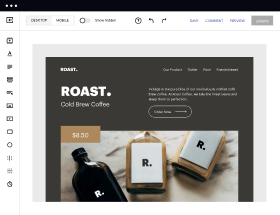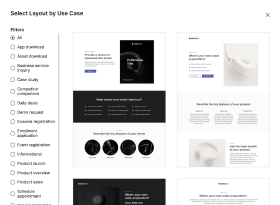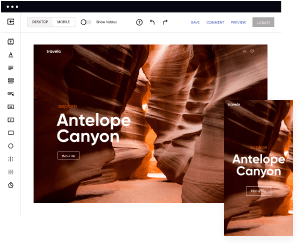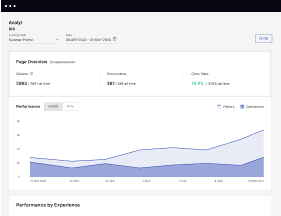Create your blog page template for Academic coaches
Master your online marketing with this builder for blog page template for Academic coaches. Try more tools to create an immaculate landing page.

Easy to build without coding
With the intuitive drag-and-drop builder, anyone on your team can create high-converting pages without any knowledge of code or design. Make enhancements to your landing page with custom widgets using Javascript, HTML/CSS, or third-party scripts.
Multiple layouts for any industry and goal
Select from 500+ landing page layouts built to boost conversions across industry-specific scenarios. Customize them by adjusting fonts, adding images, and generating on-brand content with the AI assistant. Quickly scale with Instablocks® and Global Blocks that you can save, reuse, and update globally.
Loads fast and looks polished on any device
Every template is responsive, which means they present professionally on any device and load blazingly fast with our Thor Render Engine. You can also power them up with Google AMP technology to deliver an unparalleled mobile experience and drive higher conversions.
Robust analytics & experimentation
Get real-time updates and reporting across all your devices, showing the number of visitors, conversions, cost-per-visitor, and cost-per-lead. Launch AI-powered experiments, run A/B tests, and use heatmaps to analyze user behavior, then optimize your landing page to maximize conversions.
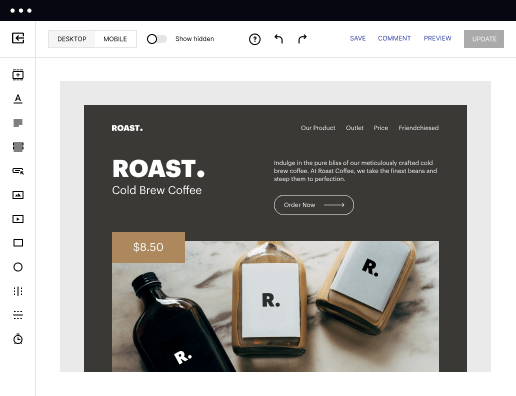
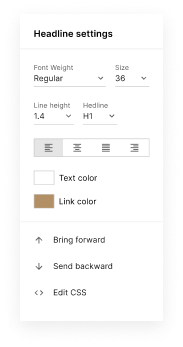
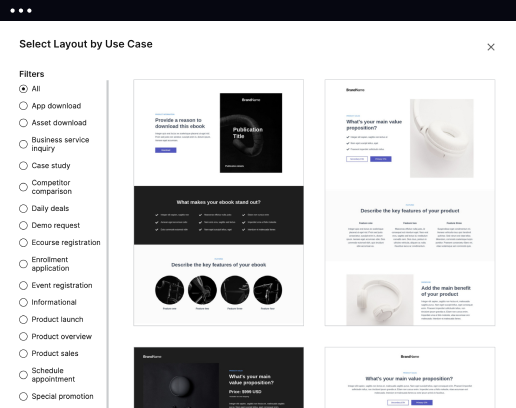
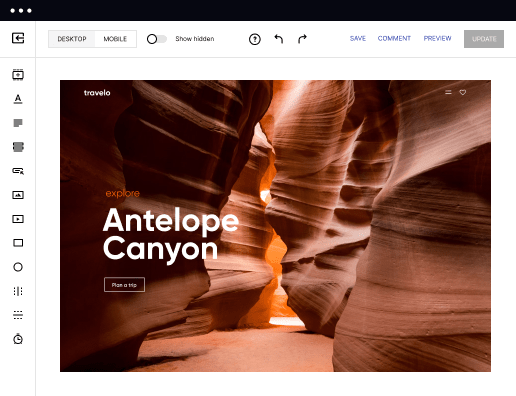
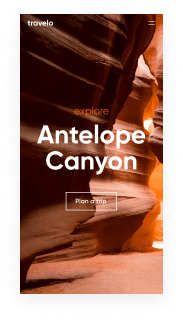
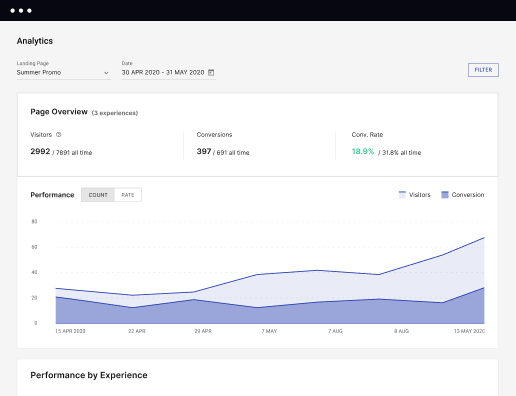
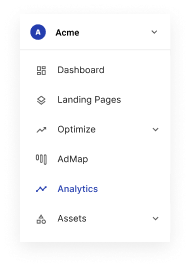
Easy to build without coding
With the intuitive drag-and-drop builder, anyone on your team can create high-converting pages without any knowledge of code or design. Make enhancements to your landing page with custom widgets using Javascript, HTML/CSS, or third-party scripts.
Multiple layouts for any industry and goal
Select from 500+ landing page layouts built to boost conversions across industry-specific scenarios. Customize them by adjusting fonts, adding images, and generating on-brand content with the AI assistant. Quickly scale with Instablocks® and Global Blocks that you can save, reuse, and update globally.
Loads fast and looks polished on any device
Every template is responsive, which means they present professionally on any device and load blazingly fast with our Thor Render Engine. You can also power them up with Google AMP technology to deliver an unparalleled mobile experience and drive higher conversions.
Robust analytics & experimentation
Get real-time updates and reporting across all your devices, showing the number of visitors, conversions, cost-per-visitor, and cost-per-lead. Launch AI-powered experiments, run A/B tests, and use heatmaps to analyze user behavior, then optimize your landing page to maximize conversions.
All the features you need to build lead-generating landing pages
Explore more featuresLearn how to build top-performing landing pages for any goal
FAQs
Leading the way in building high-performing landing pages





Accelerate Your Marketing Campaigns with Instapage's Landing Page Optimization
Creating high-converting landing pages is crucial for maximizing the ROI of digital marketing campaigns. Instapage's powerful landing page and conversion rate optimization (CRO) platform offers an array of features that empower marketers to build, optimize, and personalize their online presence with ease, tailored specifically to the diverse needs of marketing departments in business services, tech, education, and beyond.
Understanding Landing Page Success
A successful landing page is not just about aesthetics; it's about effectively capturing leads and addressing visitor needs. Instapage’s unique value proposition lies in its easy-to-use templates and lead generation elements that allow users to create dynamic pages designed for conversion without requiring any coding skills. This is essential for marketers in fast-paced industries such as marketing and advertising.
- Access to 100+ conversion-focused templates ensures variety and effectiveness, allowing quick adaptation to different campaigns.
- Pre-built lead generation elements integrate seamlessly to capture visitor information and boost ROI.
- Intuitive builders simplify page launch processes, letting you go live without the hassle of starting from scratch.
Step 1: Building Your Landing Page
The first step in leveraging Instapage's capabilities is to select a suitable landing page template that aligns with your campaign goals. Whether for an educational program or a new software launch, having a visually appealing and strategically designed page can make all the difference.
- Choose a template that suits your industry. For example, education-focused templates might prioritize information clarity to facilitate better engagement.
- Utilize Instablocks to customize sections of your page for quicker edits and a cohesive design throughout the site.
- Incorporate branding elements consistently to ensure your audience identifies with your messaging.
Step 2: Optimize for Conversions
After building your page, focus on optimizing it to ensure maximum conversions. Instapage provides built-in tools that allow you to experiment with different layouts and text placements effectively.
- Conduct A/B tests to discover which versions of your landing page yield the best results, allowing for data-driven improvements.
- Utilize heatmaps to monitor visitor behavior and identify opportunities for further optimization and adjustment.
- Assess your analytics dashboard regularly to evaluate campaign performance and make informed decisions.
Step 3: Personalization and Collaboration
The final step in enhancing your marketing effectiveness with Instapage is personalizing content and leveraging collaboration features for improved team efficiency. Dynamic text replacement allows you to align your messaging with specific audience segments.
- Adapt your messages to fit various audience demographics, fostering a personalized user experience.
- Use collaboration features to facilitate real-time edits and feedback, allowing your team to work more seamlessly and efficiently.
- Share pages securely with stakeholders to gather insights and drive decision-making processes.
With Instapage, you have the tools necessary to continuously improve your landing pages and drive better results for your marketing campaigns.
Start transforming your marketing strategy today. Explore Instapage to leverage all-in-one solutions targeted at boosting your campaign effectiveness.
Blog page template for academic coaches
Overview of blog page templates for academic coaches
In the realm of academic coaching, a blog page template serves as a critical tool that allows coaches to share insightful content efficiently. These templates are important because they provide a structured framework that displays information coherently, making it easier for both coaches and their clients to interact with the material. A well-thought-out template saves time, enhances productivity, and ensures that the content remains organized, which is essential when dealing with multiple clients and topics.
Academic coaches play a pivotal role in student development by providing personalized support, guidance, and strategies aimed at academic success. Their insights and methodologies can significantly influence a student's confidence and performance. A dedicated blog allows them to expand their reach beyond one-on-one sessions, providing helpful resources, tips, and best practices that foster a broader learning community.
A well-designed blog page also enhances coaching practices. It serves as a platform to share success stories, highlight student achievements, and discuss applicable research findings. This fosters a collaborative environment where students and coaches can interact, ask questions, and share insights, thereby improving the coaching experience.
Understanding the functionality of blog page templates
Key features of blog page templates are crucial as they determine how effectively content can be conveyed. A user-friendly design is essential; easy navigation allows readers to find relevant information without frustration. Additionally, customizable layouts enable academic coaches to tailor the appearance of their blogs to reflect specific subjects, making the content more relatable and engaging.
Incorporating multimedia options is another aspect that enhances blog functionality. Integrating images, videos, and infographics can help convey complex ideas more clearly and maintain the interest of diverse audiences. This multimedia integration can support different types of learning styles, ensuring that the blog serves a wider array of student needs.
User-friendly design for easy navigation
Customizable layouts tailored to specific academic subjects
Options for multimedia integration (images, videos, infographics)
Beyond aesthetics, optimizing for search engines is another critical functionality of blog page templates. Built-in SEO tools, for instance, can enhance visibility in search engine results, thereby driving more traffic to the coach's blog. Coaches can implement keyword integration strategies specific to their services, which helps attract the right audience.
Designing an effective blog page template
The visual elements of a blog page can significantly affect user experience. A clean and professional aesthetic not only looks appealing but also instills confidence in the content provided. Choosing a color scheme that promotes calmness and focus can enhance readers' ability to digest information, making them more likely to engage with the material.
Layout considerations are equally important. Suggested layouts for various content types, such as articles, tutorials, and success stories, help streamline the reading experience. Furthermore, utilizing white space effectively enhances readability by reducing clutter, while a responsive design ensures optimal performance across different devices, especially for mobile users.
Importance of a clean and professional aesthetic
Color schemes that promote calmness and focus
Font choices that enhance readability
Creating content that resonates
For academic coaches, developing a content strategy that resonates with the target audience is vital. Understanding the needs and interests of students allows coaches to tailor topics that are not only relevant but also engaging. Crafting compelling headlines is one way to capture attention and persuade potential readers to delve into the post.
Incorporating storytelling into content can make the coaching experience more relatable. Sharing personal experiences, challenges, and successes can help bridge the gap between coach and student, fostering a sense of connection. Additionally, catering to diverse learning styles is essential; coaches should adapt their content for visual, auditory, and kinesthetic learners by integrating interactive elements such as quizzes and polls.
Identifying target audience needs and topics of interest
Crafting compelling headlines that capture attention
Utilizing storytelling to make coaching experiences relatable
Implementing interactive features
To better engage users, academic coaches can utilize features like document.addeventlistener to create dynamic content on their blogs. This JavaScript functionality allows the page to respond to user interactions, such as button clicks and form submissions, thus enhancing the overall user experience. By listening for these events, the blog can provide timely feedback and keep users informed, making it an interactive platform rather than just a static information resource.
Another practical approach is implementing DOMContentLoaded to ensure content is fully loaded before executing JavaScript. This technique contributes to a smoother experience by preventing jarring displays of unarranged content. For instance, scrolling effects or image reveals can make navigating the blog more engaging and can help reinforce memory retention by making the experience more memorable.
Explanation of how to use document.addeventlistener to engage users
Examples of elements to listen for (button clicks, form submissions)
Enhancing the user experience through responsiveness
Promoting student-academic coach connection
Creating a sense of community among readers is vital for academic coaches looking to foster connections. A blog can serve as a hub for community interaction by hosting online workshops, live Q&A sessions, and encouraging user-generated content. This sense of belonging not only encourages students to engage more fully with the content but also builds trust and loyalty toward the coaching practice.
Leveraging blogs for professional development can further enhance a coach's practice. They can use their blog to reflect on their coaching experiences, share insights, and connect with their peers via guest posts and collaborations. Furthermore, continuous learning is essential in the field of academic coaching to stay updated about best practices and educational trends.
Strategies for fostering a sense of belonging among readers
Hosting online workshops and live Q&A sessions through blog integration
Encouraging user-generated content and testimonials
Measuring success and impact
Tracking engagement metrics is essential to evaluate a blog's performance effectively. Key metrics such as bounce rate and time spent on the page provide insights into how well the content resonates with readers. Additionally, tools that assess social media shares and interactions can highlight areas for improvement and content that engages the audience most.
Adapting to audience needs is equally important. By analyzing data to identify trends in reader preferences, coaches can adjust topics, writing styles, or posting frequency to better serve their audience. Staying updated with the latest educational trends and incorporating novel ideas into the blog not only keeps the content fresh but also positions the coach as a leader in the field.
Essential metrics to evaluate the blog's performance (bounce rate, time on page)
Tools for tracking social media shares and interactions
Utilizing feedback for continuous improvement
Final insights on maximizing blog page templates for academic coaches
In summary, key elements for success in a blog dedicated to academic coaching include innovative features like multimedia integration, user-friendly layouts, and interactive elements. These components work collectively to create a rich, engaging experience for users. Coaches should understand that the landscape of academic coaching is continually evolving; thus, a commitment to continuous learning and adaptation is paramount.
Emphasizing the role of technology in modern educational practices is also crucial for academic coaches aiming to stay relevant. By leveraging a well-designed blog page template, coaches can enhance their services while utilizing their platform to inspire and educate a wider audience.
Future trends in blog page design for academic coaching
As we look to the future, it is critical to consider evolving user expectations in blog design. There is a growing demand for interactivity, personalized experiences, and on-demand content that caters directly to the preferences of readers. Innovations in interactive content will play a vital role in how academic coaches connect with their audience, making it essential to incorporate features that encourage user interaction.
Staying ahead of trends will require academic coaches to remain agile in their approach. Embracing advancements in blog technology and understanding the needs of their audience will empower coaches to maintain their relevance in a fast-paced educational environment. Ultimately, the goal should be to create a dynamic and engaging space that fosters student success and promotes effective coaching methodologies.
Ready to skyrocket conversions?
Supercharge your ad campaigns with high-performing landing pages
Get started



